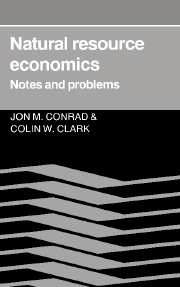4 - Environmental management
Published online by Cambridge University Press: 05 June 2012
Summary
Residuals management
The traditional economic theory of production views the firm striving to maximize profits subject to technology (characterized by a production function) and market conditions. The multiproduct firm sought the best combination of inputs to produce the best constellation of outputs (recall Problem 1.7.1). The consumer was thought to maximize ordinal utility subject to a budget (or income) constraint. The fact that production and consumption generate residuals or wastes was not explicitly considered or was dismissed by assuming “free” disposal. Situations where waste disposal resulted in pollution were known to violate the conditions for optimality of a competitive economy, but such instances of negative externality or social cost were, prior to 1960, seen as a minor distortion within a larger economic system and perhaps handled best via negotiation or tort law (Coase 1960).
It was not until the middle to late 1960s that economists came to view externality as something more “pervasive” (Ayres and Kneese 1969) and, in fact, the inevitable result of the first law of thermodynamics which requires the conservation of mass and energy within a closed system (Boulding 1966). In combination with a growing scientific and medical literature documenting the decline in air and water quality and the possible risks to public health, economists and other policy analysts became convinced of the need for a broader, “materials balance” approach to environmental management (Kneese, Ayres, and d'Arge 1970).
- Type
- Chapter
- Information
- Natural Resource EconomicsNotes and Problems, pp. 146 - 175Publisher: Cambridge University PressPrint publication year: 1987



